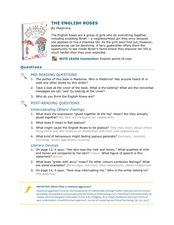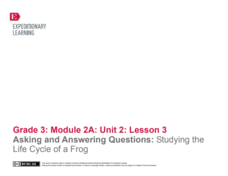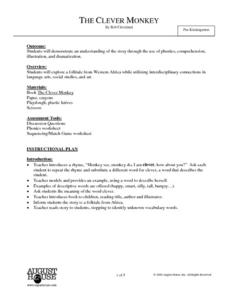Curated OER
Exploring War Themes in Art and Poetry
What is war? Students discuss the ethical dilemma of war by viewing Picasso's painting entitled "Guernica" and write down everything they see in the painting. Then they choose one emotion that best summarizes their emotional response to...
Curated OER
Emotion in Art & Poetry
Fourth graders are introduced to famous works of art and begin to discuss the artist's work. Use art to explain and reflect their own emotions. The write about feelings in a work of art and make connections between art and other...
Curated OER
Picasso's Art Styles
Students explore the life and artistic contributions of Pablo Picasso. They create a clay animation depicting one of Picasso's art periods.
Curated OER
English: Level C Lesson 99
In this English language vocabulary worksheet, students select words or phrases from 4 possible answers to complete a sentence. The sentences have varied structures with unusual topics and sometimes advanced vocabulary. The user can...
Curated OER
The English Roses
Students explore psychology by reading a children's book in class. In this bullying lesson, students read the story The English Roses and discuss the main characters, story and setting. Students identify the moments when the main...
Curated OER
Introduction to Symbolism
Your young readers might know that the stars on the American flag symbolize the fifty states, but what symbols best represent who your students are as people? Use this SMART board presentation to guide learners through an activity about...
Southern Nevada Regional Professional Development Program
“Double Double Speak Speak”
Bilateral suborbital hematoma? Call an audible? 404? Have fun with “the twittering or warbling of birds,” or as 14th century French speakers would say, have fun with “jargon.” Groups match specialized jargon with plain speech, decode...
Dream of a Nation
Big6 Research Project
Do research projects at your school look like a class of eighth graders staring at a blank screen? Use the Big 6 research method to guide middle schoolers through the process of finding a topic, searching for and evaluating sources,...
Curated OER
Charles Darwin Meets John Paul II
If you teach AP English language and composition and are looking for a way to address the differences between written and spoken arguments, consider this lesson. Over the course of three days, class members research Charles Darwin or...
Film English
Stand Up
To stand up can have many different meanings. Examine the different usages in English and relate one of these meanings to a short film about homophobic bullying. Class members view and discuss the film as well as a short reading passage...
Hawaiʻi State Department of Education
Picture Poetry
What a fun idea! The class discusses, and then writes free-verse poems using sensory detail. They get into small collaborative writing teams to compose their poems. Next, they pantomime the actions from the poem while their teammates...
Achieve3000
Discriminating Phonemes 2
Some sounds sound very similar! Help your class learn how to distinguish between various sounds by following the steps outlined in this plan. The plan includes a warm-up, a teacher-led portion, and details for guided and independent...
EngageNY
Asking and Answering Questions: Studying the Life Cycle of a Frog
A lesson challenges learners to ask and answer questions about the life cycle of a frog. With a class read-aloud, partner discussion, and notebook reflections, scholars complete a three-page worksheet to prove their understanding of the...
Virginia Department of Education
Identifying Audience and Purpose
Use a fun and creative activity to introduce junior high learners to how writing changes for different audiences and purposes. The activity begins with a reading by the instructor where teens visualize a food fight in the cafeteria. In...
Johnson County Community College
Treasured Stories by Eric Carle
Explore the works of Eric Carle with a set of four lessons focused around the stories, Brown Bear, Brown Bear, What Do You See?, Papa, Please Get the Moon For Me, and The Very Hungry Caterpillar. Young readers develop a storyboard,...
Curated OER
"Zebra" by Chaim Potok
Combine art and literature to teach greater themes and symbolic meaning. Using the plan outlined in this resource, expose your class to the story "Zebra" by Chaim Potok, conduct discussions about social issues and nicknames, and ask...
Curated OER
Rediscovering Forgotten Women Writers
Women's voices are becoming more prominent in the world of literature, but for centuries, this wasn't the case. Young historians research a woman whose writings are considered to be lost, out of print, or forgotten. They develop an oral...
August House
The Clever Monkey
Your clever kindergartners will enjoy a series of activities based on the West African folktale, The Clever Monkey, adapted by Rob Cleveland. They sequence the story with pictures, copy sentences, illustrate idioms about cats, and taste...
EngageNY
Contrasting Perspectives: Should the Farmworkers in Esperanza Rising Go On Strike? (Chapter 12: "Los Esparragos/Asparagus")
Explore multiple perspectives through a jigsaw activity that will improve your pupils' understanding of the characters in Esperanza Rising as well as their understanding of strikes and human rights. Tapping into prior knowledge, and...
Curated OER
Understanding and Using Suffixes to Expand Vocabulary
After a review of what suffixes are and how they are used, middle schoolers utilize a worksheet that is embedded in the plan to work in pairs to strengthen their understanding and skills in using these very important parts of our...
Ontario
Critical Literacy—Media Texts
Media texts convey both overt and implied messages. As part of their study of media, class members analyze the language, form, techniques, and aesthetics in a variety of media texts.
Roald Dahl
The Twits - Dirty Beards
The problem with beards is that they collect a lot of food. The first lesson plan in an 11-part unit related to The Twits by Roald Dahl explores the hairy jungle that is Mr. Twit's beard. A concluding project has learners create their...
Scholastic
Choose Your Words Wisely (Grades 9-12)
Words, words, words. The function of words in persuasive writing is the focus of a group activity that asks members to analyze how words advertisers use are designed to influence targeted audiences.
Hawaiʻi State Department of Education
Changing Scapes
Culture and art are two things that change with time and context. Learners compare and contrast two landscape prints from different time periods. They work through art terminology to help them describe what they see in each piece. The...
Other popular searches
- English Language Arts
- English Language Arts Exam
- English Language Arts Games
- Deaf English Language Arts
- English Language Arts Music
- English Language Arts Heroes
- English Language Arts Skills
- English Language Arts Grade 3
- English/language Arts
- English Language Arts Poetry
- English Language Arts Rating=3
- English Language Arts Unit Sc

























